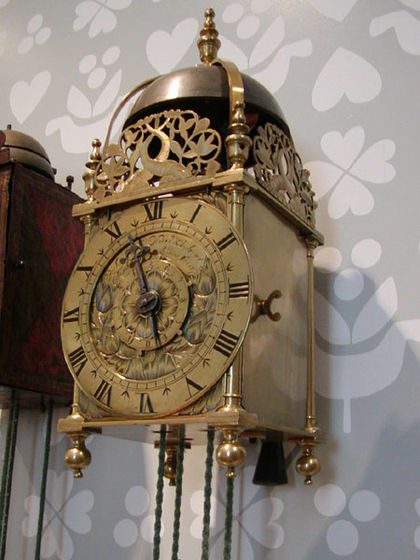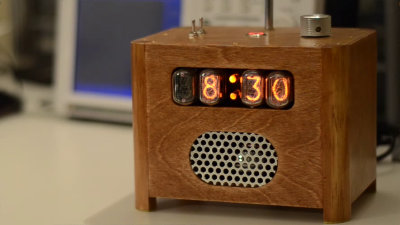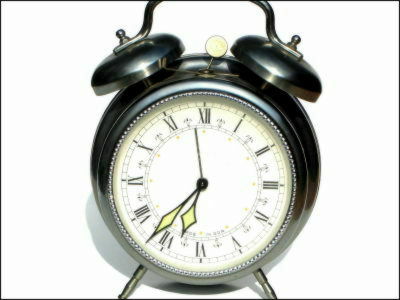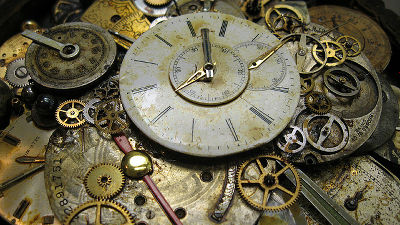How did people awake before the alarm clock was born?

by Vic
In modern times many people use "alarm clock" to wake up in the morning, but there are many people who say "If you do not ring the alarm clock you will sleep forever". The science-based site, Live Science , explains about the question of how the people before the birth of such an alarm clock woke up.
How Did People Wake Up Before Alarm Clocks?
https://www.livescience.com/64002-how-wake-up-before-alarm-clocks.html
There may not be other instruments of civilization that grudges from people as much as an alarm clock. However, before people invented alarm clocks in the first place people get up when they are in the morning properly. Even a simple mechanism of "knowing the time" is a great invention for human beings, and it became possible to measure time by developing equipment such as a sundial and a water clock has given great change to human life Thing.
From the early days when the watch was invented, a device to teach the time of waking up in the morning using a candle clock has been invented. An alarm clock using a candle clock used in ancient China says that a candle filled with kuki inside is put in the fire before going to bed, and the wax melts as the time elapses and the underwear falls. By placing a metallic tray in the place where the nail falls, the fallen Kugi wakes up a person sleeping with loud noise.
However, this early alarm clock was inaccurate and could not produce a sound at the exact time. After all it is a period of time after a precise mechanical alarm clock was born that many people will wake up with an alarm clock.

by H is for Home
Humans control the biological state of awake and sleep patterns by native homeostasis (homeostasis). Melinda Jackson, who is studying sleep and psychology at the Royal Melbourne Institute of Technology , said, "The longer you get up, the more sleepy you are, and that 'sleeping power' diverges while sleeping "When it stays long, nature and people have fallen asleep, and when they are asleep, it is said that nature and people are made to be led to wake-up.
The circadian rhythm (body clock) which is superimposed on this homeostasis and affects waking and sleeping is a 24 hour period physiological phenomenon. The body clock controls the stages of sleep and wakefulness throughout the day and is influenced by external stimuli such as sunlight and night darkness. As a result, the period of human arousal and sleeping corresponds to the morning when it gets bright and the night when it gets darker, and it is said that it is creating the basic rhythm of "waking up in the morning asleep at night".

by Mirai Takahashi
Sacha Handley, who is studying the history of sleeping habits at the University of Manchester , has found that people in the early modern UK people had a habit of going to bed in the east and going to bed. In the direction of the east there seems to be a religious meaning "it is the direction where the resurrected Jesus is coming", but depending on the direction to turn this bed, people received a morning sun rising in the east and were able to wake up I mentioned about sex.
Also, people in the past did not have effective means to prevent sounds echoing from the surroundings of the house. Therefore, "In the area like a rural village before the industrial revolution, the sound emitted by nature may have had an important role in getting up," Handley said. Noises such as chickens and cries of livestock who awoke in the morning may have played the same role as alarm clocks waking up people living in rural areas asleep. Also, Mr. Handley said the sound of the bell ringing the church also acted as a kind of alarm clock.
From a religious point of view, Mr. Handley believes that modern British people had an awareness of early time in the morning, "spiritual time that could approach God." Therefore, it seems that the act of "get up early in the morning and pray to God" became a strong motivation for people, helping people get up early in the morning.

by Saint Joseph
However, as the lantern watches spread from 1600 to 1700, the necessity of having a will to have a strong will to wake up in the morning has diminished. The mechanical lantern watch has an alarm function, so even though I do not want to get up, people have been brought up by alarm of the lantern clock.

Also, in England there is a profession called "raising a sleeping person" called knocker up , hitting the entrance door with a stick and hitting the window on the higher floor with a long stick, the inhabitants I was running around. Knocker Up was said to have been active in the UK from the 1930s to the 1940s when inexpensive alarm clocks were popular.
In recent years people are awake by way of an alarm clock, but it is subtle whether truly alarm clocks are wonderful for human life. People seem to be staying up late than before, watching the screen of TVs, laptops, smartphones, etc, with less sleeping time. Mr. Jackson pointed out that the priority of sleeping is decreasing and said, "There is no way to wake up except by using an alarm clock."
According to Mr. Handlery, sleep was more sacred in the past. People drank sleeping herbal tea before bedtime, stuffed with calm fragrant flowers in the pillow, dedicated prayers and did not use heads like embroidery. Mr. Handley said "Sleep should be at the center of the 24-hour cycle" to modern people with insufficient sleep, and it is not difficult to wake up without an alarm clock in that way.

Related Posts:
in Note, Posted by log1h_ik







